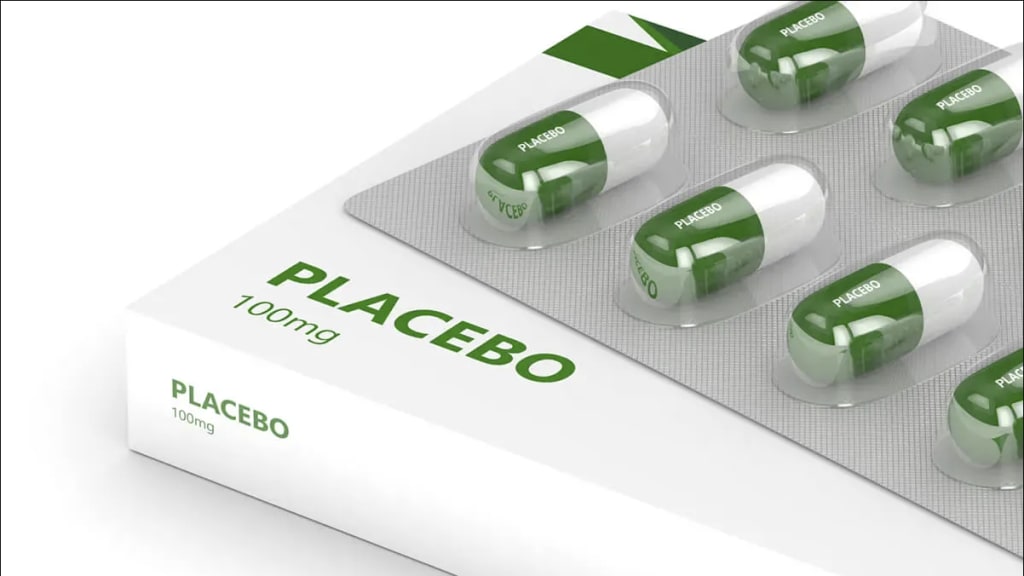Placebo Effect In Research :
Why placebo pills work in any event, when you know they're a placebo

In 2014, the American footballer Marshawn Lynch - a previous NFL running back nicknamed 'Monster Mode' since he destroyed and ran over would-be tacklers - marked a support manage Skittles. This was more than business. To Lynch, Skittles aren't simply Skittles. Since he was youthful, the button-formed confections have been his distinct advantage.
As a rising football star in secondary school, Lynch was frequently struck by uneasiness ahead of his games. It was frequently so outrageous it caused an extraordinary irritated stomach. Youthful Lynch attempted a few over-the-counter cures, however nothing appeared to work. Then one day, his mom, Delisa Lynch, let him know that Skittles would settle his stomach. That, however she said the Skittles would likewise make him play better: 'They will make you run quick, and they will make you play great.' And, some way or another, they did.
No offense to Skittles sweethearts, yet there's nothing exceptional about them. They're for the most part sugar, corn syrup and fake flavors. However, all through his school football and famous NFL profession, Lynch clutched the conviction that Skittles helped his game, and he generally ate them prior to taking the field. You could accept that the Skittles were, as far as he might be concerned, only a senseless pre-game custom. However, by eating the Skittles and accepting that they worked on his presentation, Lynch was exploiting an undeniable peculiarity: the placebo impact.
The placebo impact happens when somebody encounters an advantage due fundamentally to the conviction that something they are doing - taking a medicine, taking part in a custom, or seeking treatment - will make an advantageous difference. Placebos are undeniably more impressive than the vast majority understand. They've been displayed in research preliminaries to assist with diminishing uneasiness, melancholy, torment, asthma, the engine side effects of Parkinson's sickness, and recuperation from osteoarthritis of the knee. It's significant that these advantages aren't simply found as far as how individuals feel, albeit that by itself is significant, yet in addition regarding quantifiable physiological enhancements.
The force of the placebo impact is with the end goal that new medications are expected to show that they have extra advantages, far in excess of a placebo, before they can go to showcase. Most medication and conduct mediation preliminaries bomb this test - not on the grounds that the medications or intercessions don't work, but since the placebo impact is so solid.
Considering that placebos are a strong treatment all alone, we could ask ourselves: for what reason would they say they are not being utilized as a treatment all the more generally?
Perhaps the greatest obstruction is a moral quandary. From one viewpoint, placebos are exceptionally compelling for specific side effects and conditions, and can make a genuine remedial difference. Then again, to profit from placebos, the dominating reasoning has been that individuals should be deluded into accepting they're taking a functioning treatment. Since most clinical specialists worldwide have concurred - for good reasons - that misleading patients is definitely not a best practice, this dependence on duplicity has forestalled the broad utilization of placebos as medicines all by themselves.
Be that as it may, what might be said about the situation of Marshawn Lynch? Obviously, he realizes that Skittles don't actually have mystical abilities. He likewise knows the real elements of Skittles can't make him run quicker or play better. But, he keeps taking them, trusting in and clearly partaking in their helpful impacts.
Lynch's experience mirrors an arising research pattern to concentrate on the conceivable gainful impacts of placebos given without duplicity, otherwise called 'open-name placebos' or 'non-misleading placebos'. In a basic report in 2010, specialists at Harvard Medical School randomized patients encountering crabby gut disorder (IBS) side effects into either an open-name placebo bunch or a no-therapy control bunch - and vitally, every one of the patients realized which bunch they were in. The specialists told patients in the open-name placebo bunch that the placebo impact is strong, that the body can answer naturally to taking placebo pills (like the exemplary molding illustration of Pavlov's canines, who salivated at the supper ringer), that an uplifting outlook helps however isn't needed, and that it is essential to take the pills dependably for the whole 21-day concentrate on period, no matter what their faith in the pills. Before the finish of the review, despite the fact that the placebo pills contained no dynamic fixings, and regardless of the patients realizing they'd been taking placebos, they detailed less IBS side effects and more improvement in general personal satisfaction than patients in the no-treatment control bunch.
This worldview of giving non-tricky placebo pills as treatment has been rehashed, including a new replication of the advantage for IBS, while different preliminaries have shown benefits for patients with ADHD and feed fever. Obviously, further exploration recommends that open-name placebos can likewise work in non-clinical settings. Along with associates, one of us (Darwin) displayed in 2020 that an open-name placebo nasal splash diminished the misery incited by checking genuinely disturbing pictures out. Like Lynch's Skittles, the open-mark placebo we utilized assisted our workers with dealing with their sentiments and tension, an impact that was even noticeable in their electrical mind movement.
So what's truly happening here? Not simply the sugar pill prompts these progressions in brain research and physiology, and it's not wizardry by the same token. Research in medication and brain science on both conventional and open-mark placebos recommends a few components at play.
One is individuals' assumptions, or the positive conviction that a treatment could make advantageous impacts. In open-mark placebo studies, including Darwin's nasal splash study referenced above, individuals are regularly informed that a confidence in the placebo isn't required, yet they are urged to keep a receptive outlook. A portion of the clinical examinations have involved volunteers for whom numerous different medicines have fizzled, thus they have added motivation to trust that this trial, somewhat unconventional treatment could work for them. Arising research recommends that this conviction may be somewhat liable for the advantages. For instance, a review one of us (Kari) ran as a feature of her PhD showed that open-mark placebos prompted a decrease in unfavorably susceptible reaction from a receptor skin-prick test, yet just for those volunteers who trusted emphatically in the advantageous force of placebos.
Another conceivable instrument is molding, in which the body figures out how to connect advantageous impacts with an activity or custom. A large number of us have had rehashed encounters of taking pills that assist with decreasing our side effects - ibuprofen for a migraine, NyQuil for a cold, or Pepto Bismol for an agitated stomach. After some time, the body might figure out how to connect taking a pill with side effect alleviation. So the actual demonstration of taking a pill itself can catalyze the body's own ability for mending.
This molding is at times done expressly in research with open-name placebos. In one clinical review, specialists asked patients recuperating from spine medical procedure to match their dynamic aggravation drug with open-mark placebos and furthermore to take the placebo pills all alone. The placebo pills started applying their own relief from discomfort. Contrasted and the benchmark group who got treatment to the surprise of no one, patients who additionally took the open-mark placebo pills consumed around 30% less day to day morphine in the days after medical procedure.
There are additionally other, less all around concentrated on components that might be affecting everything in open-name placebo impacts. For instance, when somebody begins taking a treatment - placebo or not - they regularly start focusing harder on their own personalities and bodies. Most circumstances and side effects vacillate over the long haul. For instance, when we are encountering a cerebral pain, regardless of whether we make any medicine or other move, the seriousness of that migraine will normally diminish after some time. Individuals who take open-mark placebo pills might expect improvement, making them more sensitive to times when their side effects die down. Other exploration shows that clinical customs - whether that is taking a pill, getting an infusion, or simply having some tea and cleaning up - can summon the two assumptions for mending and a molded reaction. Consequently, the demonstration of taking pills steadfastly can turn into a mending clinical custom all by itself.
Now that we are seeing a gathering of proof that open-name placebos may be useful, scientists and clinicians are beginning to contemplate how to apply them practically speaking to help patients. For specific circumstances, especially those, for example, IBS that have proactively been contemplated, open-name placebos could be a successful treatment all alone. As the American footballer Marshawn Lynch has known for quite a long time, and new exploration is illustrating, open-mark placebos could likewise be utilized for decreasing pressure and tension to assist individuals with getting in the zone before tests or games. Also, as exploration keeps consolidating open-mark placebos with existing drugs, we might find them valuable for tightening or diminishing dosages of meds that make side-impacts, for example, torment prescriptions or meds for issues like ADHD.
Flow and future exploration is proceeding to reveal insight into which conditions open-name placebos may be the most appropriate to. As the field grows, a discussion should follow: will open-mark placebos at any point turn out to be essential for standard medication? Is it better to zero in endeavors on persuading specialists (and patients) that open-name placebos can be compelling, or would it be a good idea for us to more readily comprehend the instruments of open-name placebo impacts and attempt to outfit those components related to dynamic drugs and medicines, for example, by supporting patient assumptions? Will open-name placebos at any point be in excess of a semi-periphery final hotel for conditions and patients for whom most different medicines have fizzled?
Of no little thought is the way that, with minimal expenditure to be produced using recommending sugar pills, the compelling drug industry has no motivating force to advance this sort of prescription over licensed, privatized meds and medicines. In numerous ways, research on open-name placebos is as yet in its early stages. The following 10 years might decide a definitive effect of this exploration. As the field advances, one of us (Darwin) plans to proceed to explore and upgrade open-mark placebo impacts on pressure, tension and misery in both clinical and non-clinical settings.
On a singular level, while taking open-name placebos - or Skittles - is certainly not a substitute for looking for clinical exhortation or treatment, in the event that you're attempting to resemble Marshawn Lynch, you could start to contemplate how you could involve open-name placebos in your own life. As a beginning stage, when you take a genuine prescription, like Tylenol (paracetamol), you could attempt to help a portion of the applicable components - like assumptions and molding - for instance, by helping yourself to remember the advantages you anticipate. You could consider involving your very own portion open-mark placebos for minor issues that don't need clinical mediation, for example, hurts and minor agonies, stress and nervousness, trouble dozing, or less than overwhelming irritated stomach. You can drink tea (helping yourself that parts to remember natural teas really do truly contain dynamic mending fixings), wash up (which can likewise have health advantages), or do different ceremonies that assist you with feeling quite a bit improved while intentionally zeroing in on their recuperating benefits. Have a go at tracking down your own form of an open-mark placebo to help you in the midst of hardship. The science says it could very well work.






Comments
There are no comments for this story
Be the first to respond and start the conversation.